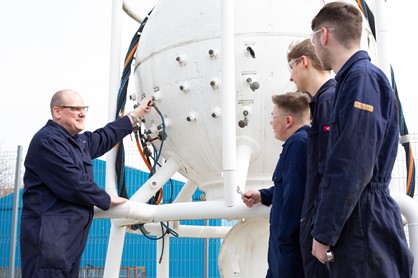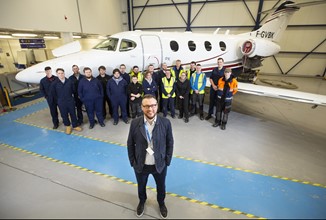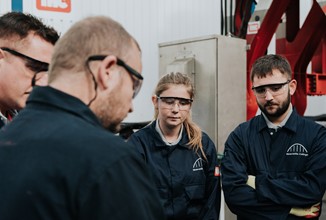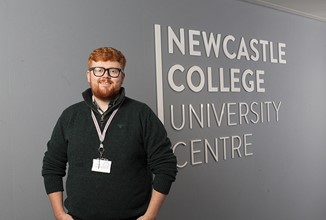
BEng (Hons) Energy Engineering (Top Up) (Part-Time)
Start Date: 9th September 2024

- Length 1 year
- Study Part-Time
- Location Energy Academy
More about the course
This part-time course will allow you to develop an understanding of deeper engineering theories and practices within the Renewables and Subsea sector and add to knowledge you already have by exploring current industry concepts and problems.
You will explore a variety of core vocational modules, and take the opportunity to take theory and put it into engineering practice. You will study modules in Fuels and Energy Systems, Smart Grid Technologies, and Energy Management and Economics. Alongside this, an industry-focused dissertation will be completed to allow you to focus on specific specialism of your interest, focusing your engineering passion towards a unique set of problems.
This course is supported by local and national partnerships and you will work collaboratively with current practicing engineers. The Energy Academy is a built-for-purpose site dedicated to the Green Sector, supported by partners and companies on our door-step. You will work on our bespoke Virtual Reality Training Simulator to get direct hands-on experience of the operations of turbine equipment. Similarly, you could be using ROV software to carry out drone inspection activities at the Port of Blyth training facility.
Get in touch
Meet our staff and students

Niall Kendal
FdEng Subsea and Offshore Engineering"Throughout my apprenticeship and studies, I've developed a great understanding of the industry, a strong knowledge base, and I get to put theory into practice while I'm offshore. I want to challenge myself to enter a management role in the Energy industry eventually, and I know my degree from Newcastle College University Centre will help me achieve that dream."
What can I do with a qualification in Energy?
Daily tasks:
- Organises and establishes control systems to monitor the performance and safety of electrical assemblies and systems.
- Ensures that manufacture, operation and maintenance comply with design specifications and contractual arrangements.
- Determines and specifies manufacturing methods of electrical systems.
- Supervises, controls and monitors the operation of electrical generation, transmission and distribution systems.
Powered by EMSI
Daily tasks:
- Tests, diagnoses faults and undertakes repair of electronic equipment.
- Organises and establishes control systems to monitor performance and evaluate designs.
- Determines and specifies appropriate production and/or installation methods and quality and safety standards.
- Undertakes research and advises on all aspects of telecommunications equipment, radar, telemetry and remote control systems, data processing equipment, microwaves and other electronic equipment.
Powered by EMSI
Daily tasks:
- Prepares specifications for materials and other components.
- Produces final design information for use in preparation of layouts, parts lists, etc..
- Arranges construction and testing of model or prototype and modifies design if necessary.
- Prepares working designs for steam, aero, turbine, marine and electrical engines, mechanical instruments, aircraft and missile structures, vehicle and ship structures, plant and machinery equipment, domestic electrical appliances, building systems and services, and electronic computing and telecommunications equipment.
- Assesses product requirements, including costs, manufacturing feasibility and market requirements.
Powered by EMSI
Daily tasks:
- Provides technical consultancy services.
- Examines and advises on patent applications.
- Prepare sketches, drawings and specifications showing materials to be used, construction and finishing methods and other details.
- Devises and implements control systems to monitor operational efficiency and performance of system and materials.
- Designs new systems and equipment with regard to cost, market requirements and feasibility of manufacture.
- Establishes principles and techniques to improve the quality, durability and performance of materials such as textiles, glass, rubber, plastics, ceramics, metals and alloys.
- Researches into problem areas to advance basic knowledge, evaluate new theories and techniques and to solve specific problems.
Powered by EMSI
Daily tasks:
- Visits and advises clients on the use and servicing of mechanical and chemical engineering products and services.
- Inspects completed aircraft maintenance work to certify that it meets standards and the aircraft is ready for operation.
- Diagnoses and detects faults and implements procedures to maintain efficient operation of systems and equipment.
- Prepares estimates of materials, equipment and labour required for engineering projects.
- Sets up equipment, undertakes tests, takes readings, performs calculations and records and interprets data.
- Plans and prepares work and test schedules based on specifications and drawings.
Powered by EMSI
Daily tasks:
- Monitors the standards of scientific and technical research undertaken by the research team.
- Plans work schedules, assigns tasks and delegates responsibilities to the research and development team.
- Develops research methodology, implements and reports upon research investigations undertaken.
- Liaises with production departments to investigate and resolve manufacturing problems.
- Establishes product design and performance objectives in consultation with other business functions.
Powered by EMSI
Daily tasks:
- Checks finished workpiece for defects and conformity with specification.
- Cleans and smoothes weld.
- Guides electrode or torch along line of weld, burns away damaged areas, and melts brazing alloy or solder into joints.
- Cuts metal pieces using gas torch or electric arc.
- Connects wires to power supply, or hoses to oxygen, acetylene, argon, carbon dioxide, electric arc, or other source and adjusts controls to regulate gas pressure and rate of flow.
- Selects appropriate welding equipment such as electric arc, gas torch, etc..
Powered by EMSI
What can I do with a qualification in Energy?
Electrical engineers
Daily tasks:
- Organises and establishes control systems to monitor the performance and safety of electrical assemblies and systems.
- Ensures that manufacture, operation and maintenance comply with design specifications and contractual arrangements.
- Determines and specifies manufacturing methods of electrical systems.
- Supervises, controls and monitors the operation of electrical generation, transmission and distribution systems.
Powered by EMSI
Electronics engineers
Daily tasks:
- Tests, diagnoses faults and undertakes repair of electronic equipment.
- Organises and establishes control systems to monitor performance and evaluate designs.
- Determines and specifies appropriate production and/or installation methods and quality and safety standards.
- Undertakes research and advises on all aspects of telecommunications equipment, radar, telemetry and remote control systems, data processing equipment, microwaves and other electronic equipment.
Powered by EMSI
Design and development engineers
Daily tasks:
- Prepares specifications for materials and other components.
- Produces final design information for use in preparation of layouts, parts lists, etc..
- Arranges construction and testing of model or prototype and modifies design if necessary.
- Prepares working designs for steam, aero, turbine, marine and electrical engines, mechanical instruments, aircraft and missile structures, vehicle and ship structures, plant and machinery equipment, domestic electrical appliances, building systems and services, and electronic computing and telecommunications equipment.
- Assesses product requirements, including costs, manufacturing feasibility and market requirements.
Powered by EMSI
Engineering professionals n.e.c.
Daily tasks:
- Provides technical consultancy services.
- Examines and advises on patent applications.
- Prepare sketches, drawings and specifications showing materials to be used, construction and finishing methods and other details.
- Devises and implements control systems to monitor operational efficiency and performance of system and materials.
- Designs new systems and equipment with regard to cost, market requirements and feasibility of manufacture.
- Establishes principles and techniques to improve the quality, durability and performance of materials such as textiles, glass, rubber, plastics, ceramics, metals and alloys.
- Researches into problem areas to advance basic knowledge, evaluate new theories and techniques and to solve specific problems.
Powered by EMSI
Engineering technicians
Daily tasks:
- Visits and advises clients on the use and servicing of mechanical and chemical engineering products and services.
- Inspects completed aircraft maintenance work to certify that it meets standards and the aircraft is ready for operation.
- Diagnoses and detects faults and implements procedures to maintain efficient operation of systems and equipment.
- Prepares estimates of materials, equipment and labour required for engineering projects.
- Sets up equipment, undertakes tests, takes readings, performs calculations and records and interprets data.
- Plans and prepares work and test schedules based on specifications and drawings.
Powered by EMSI
Science, engineering and production technicians n.e.c.
Research and Development Managers
Daily tasks:
- Monitors the standards of scientific and technical research undertaken by the research team.
- Plans work schedules, assigns tasks and delegates responsibilities to the research and development team.
- Develops research methodology, implements and reports upon research investigations undertaken.
- Liaises with production departments to investigate and resolve manufacturing problems.
- Establishes product design and performance objectives in consultation with other business functions.
Powered by EMSI
Welding Trades
Daily tasks:
- Checks finished workpiece for defects and conformity with specification.
- Cleans and smoothes weld.
- Guides electrode or torch along line of weld, burns away damaged areas, and melts brazing alloy or solder into joints.
- Cuts metal pieces using gas torch or electric arc.
- Connects wires to power supply, or hoses to oxygen, acetylene, argon, carbon dioxide, electric arc, or other source and adjusts controls to regulate gas pressure and rate of flow.
- Selects appropriate welding equipment such as electric arc, gas torch, etc..
Powered by EMSI
Good to know
What's happening?
Events
Either
- The level required to start the course
- The level rewarded when completing the course
Not a Newcastle College student?
If you are not currently a Newcastle College student, apply here:
VISIT UCASNewcastle College students
If you are a current Newcastle College student, apply here:
CURRENT STUDENT APPLICATIONor Continue Browsing
Course Added
This course has now been added to your basket. Please click below to apply now or continue browsing.
Apply Now Levels Explained
Levels Explained


